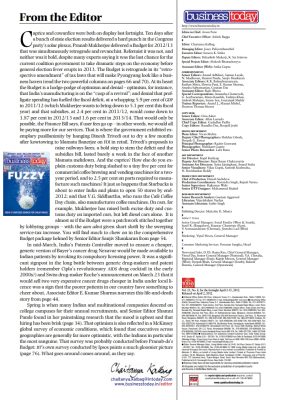Fuzzy
[Business Today]
Published date: 15th Apr 2012
Caprice and cowardice were both on display last fortnight. Ten days after a bunch of state election results delivered a hard punchi in the Congress party’s solar plexus, Pranab Mukherjee delivered a Budget for 2012/13 that was simultaneously retrograde and revanchist. Reformist it was not, and neither was it bold, despite many experts saying it was the last chance for the current coalition government to take dramatic steps on the economy before general election fever erupts in 2013. The Budget is retrograde in its “retrospective amendment” of tax laws that will make Pyongyang look like a business haven (read the two powerful columns on pages 66 and 70). At its heart the Budget is a hodge-podge of optimism and denial optimism, for instance, that India’s manufacturing is on the “cusp of a revival”; and denial that profligate spending has fuelled the fiscal deficit, at a whopping 5.9 per cent of GDP in 2011/12 (which Mukherjee wants to bring down to 5.1 per cent this fiscal year) and that subsidies, at 2.4 per cent in 2011/12, would come down to 1.87 per cent in 2012/13 and 1.6 per cent in 2013/14. That would only be possible, the Finance Bill says, if user fees go up in other words, we would all be paying more for our services. That is where the government exhibited exemplary pusillanimity by hanging Dinesh Trivedi out to dry a few months after kowtowing to Mamata Banerjee on FDI in retail. Trivedi’s proposals to raise railways fares, a bold step to stem the deficit and the subsidies bill, lasted barely a week in the face of another Mamata meltdown. And the caprice? How else do you explain customs duty being slashed to a tiny five per cent for commercial coffee brewing and vending machines for a two- year period, and to 2.5 per cent on parts required to manufacture such machines? It just so happens that Starbucks is about to enter India and plans to open 50 stores by end- 2012; and that V.G. Siddhartha, who runs the Café Coffee Day chain, also manufactures coffee machines. On cars, for example, Mukherjee has raised both excise duty and customs duty on imported cars, but left diesel cars alone. It is almost as if the Budget were a patchwork stitched together by lobbying groups with the aam admi given short shrift by the sweeping service-tax increase. You will find much to chew on in the comprehensive Budget package helmed by Senior Editor Sanjiv Shankaran from page 54.
In mid-March, India’s Patents Controller moved to ensure a cheaper. generic version of Bayer’s cancer drug Nexavar would be made available to Indian patients by invoking its compulsory licensing power. It was a significant signpost in the long battle between generic drug-makers and patent holders (remember Cipla’s revolutionary AIDS drug cocktail in the early 2000s?) and Swiss drug-maker Roche’s announcement on March 23 that it would sell two very expensive cancer drugs cheaper in India under local licence was a sign that the poorer patients in our country have something to cheer about. Associate Editor E. Kumar Sharma narrates this life-and-death story from page 44.
Spring is when many Indian and multinational companies descend on college campuses for their annual recruitments, and Senior Editor Shamni Pande found in her painstaking research that the mood is upbeat and that hiring has been brisk (page 34). That optimism is also reflected in a McKinsey global survey of economic conditions, which found that executives across geographies are generally far more optimistic, with the Indians in particular the most sanguine. That survey was probably conducted before Pranab-da’s Budget: BT’s own survey conducted by Ipsos paints a much gloomier picture (page 76). What goes around comes around, as they say.






